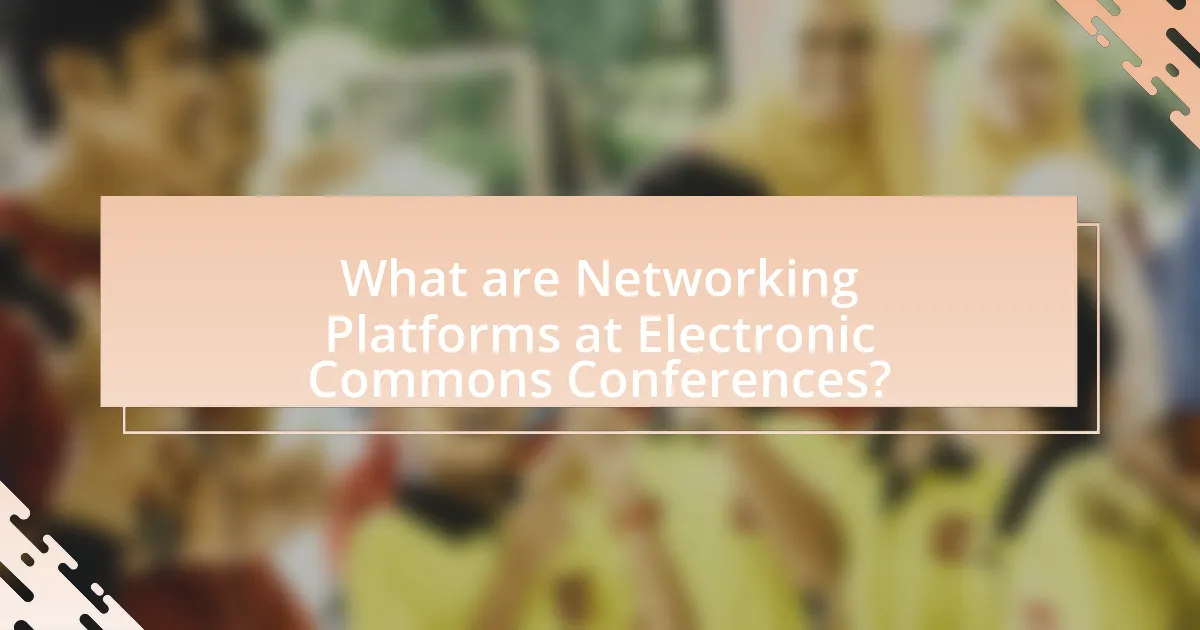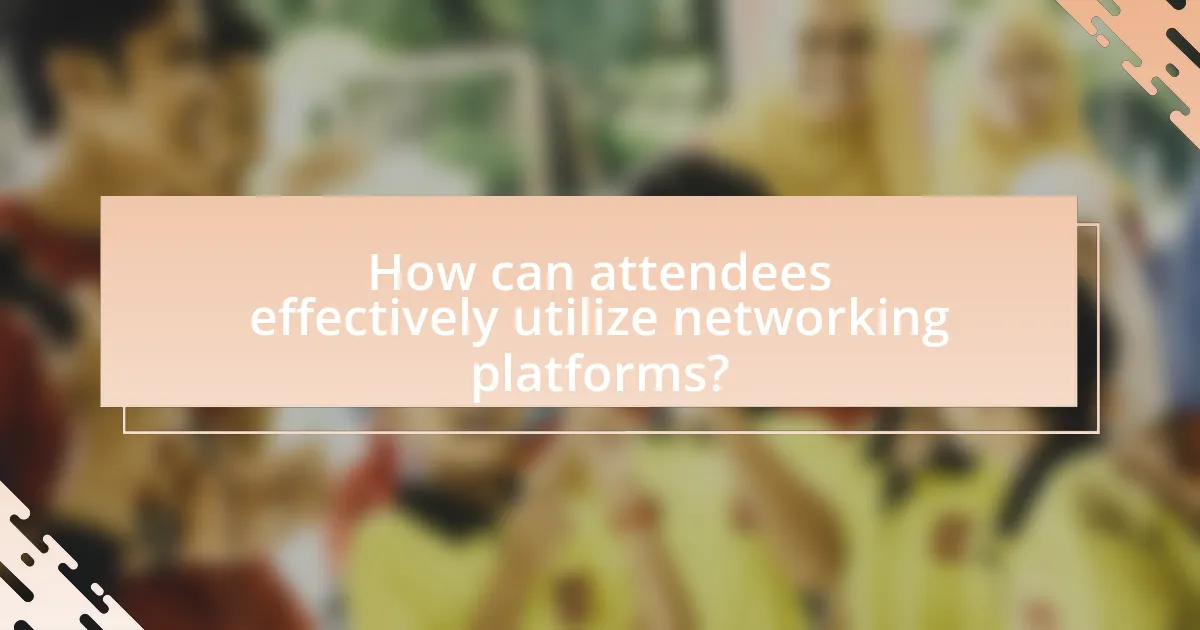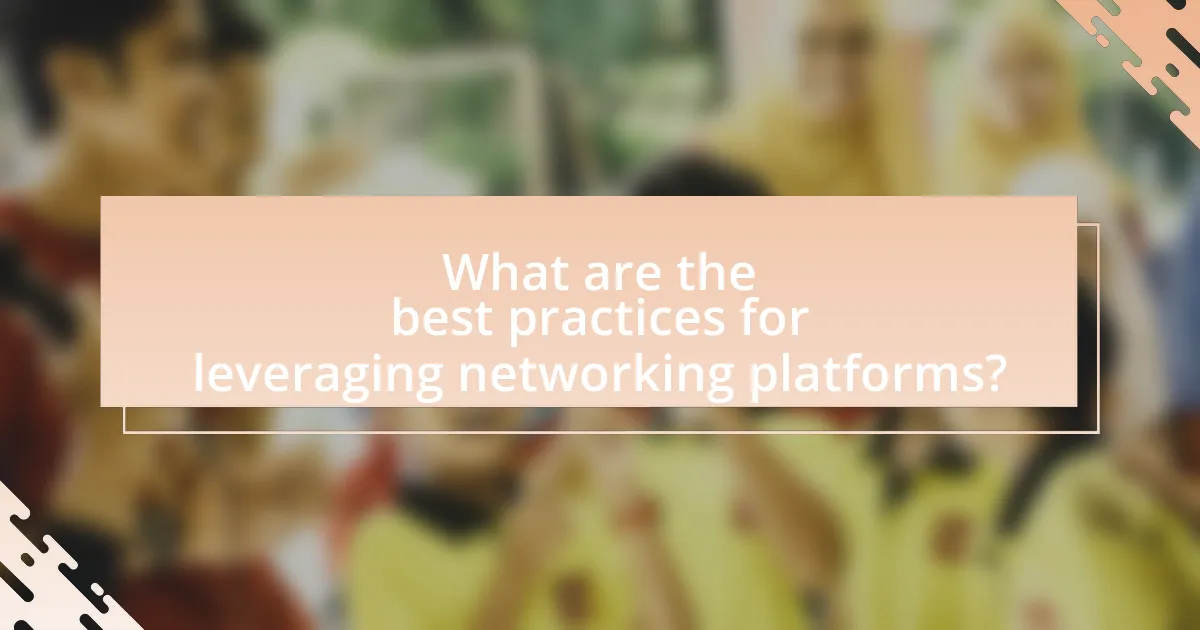Networking platforms at Electronic Commons Conferences are essential digital tools that enhance interaction, collaboration, and communication among attendees. These platforms, which include features like chat rooms, virtual meeting spaces, and discussion forums, facilitate real-time exchanges and networking opportunities, ultimately fostering professional relationships. The article outlines how these platforms can be effectively utilized to maximize attendee engagement, the importance of networking for career advancement, and strategies for successful interactions, including preparation, active participation, and follow-up. Additionally, it highlights common mistakes to avoid and best practices for leveraging these platforms to create meaningful connections and enhance professional growth.

What are Networking Platforms at Electronic Commons Conferences?
Networking platforms at Electronic Commons Conferences are digital tools and environments designed to facilitate interaction, collaboration, and communication among attendees. These platforms enable participants to connect with peers, share ideas, and engage in discussions relevant to their fields. For instance, features such as chat rooms, virtual meeting spaces, and forums are commonly integrated into these platforms, allowing for real-time exchanges and networking opportunities. The effectiveness of these platforms is evidenced by their ability to enhance attendee engagement and foster professional relationships, which are critical for maximizing the impact of participation in such conferences.
How do these platforms facilitate connections among attendees?
These platforms facilitate connections among attendees by providing features such as chat rooms, discussion forums, and networking tools that enable real-time communication and interaction. For instance, attendees can engage in targeted discussions based on shared interests or topics, which enhances networking opportunities. Additionally, many platforms offer attendee profiles that allow users to showcase their expertise and interests, making it easier for like-minded individuals to connect. Research indicates that effective networking can lead to increased collaboration and knowledge sharing, which is essential for maximizing impact at conferences.
What types of networking platforms are commonly used?
Commonly used networking platforms include LinkedIn, Facebook, Twitter, and specialized forums like ResearchGate. LinkedIn is primarily utilized for professional networking, allowing users to connect with industry peers and showcase their work experience. Facebook serves as a social networking site that also facilitates group discussions and event planning. Twitter is often used for real-time updates and networking through hashtags, while ResearchGate focuses on academic and research-oriented networking, enabling scholars to share publications and collaborate. These platforms are widely recognized for their effectiveness in fostering connections and facilitating communication among users in various fields.
How do these platforms enhance attendee engagement?
These platforms enhance attendee engagement by facilitating real-time interaction and networking opportunities among participants. Features such as live chat, Q&A sessions, and virtual breakout rooms allow attendees to connect directly with speakers and each other, fostering a sense of community. Additionally, analytics tools track engagement metrics, enabling organizers to tailor content and sessions based on attendee interests and participation levels, which has been shown to increase overall satisfaction and involvement in events.
Why is networking important at Electronic Commons Conferences?
Networking is important at Electronic Commons Conferences because it facilitates collaboration and knowledge sharing among participants. Engaging with peers, industry leaders, and experts allows attendees to exchange ideas, gain insights into emerging trends, and establish professional relationships that can lead to future partnerships. Research indicates that 70% of jobs are found through networking, highlighting its critical role in career advancement and opportunities within the electronic commons community.
What opportunities does networking provide for attendees?
Networking provides attendees with opportunities to establish professional connections, share knowledge, and collaborate on projects. By engaging with peers and industry leaders, attendees can gain insights into best practices and emerging trends, which can enhance their expertise. Additionally, networking can lead to potential job opportunities, partnerships, and mentorships, as studies show that 70% of jobs are found through networking. This statistic underscores the importance of building relationships within professional communities, particularly at conferences where like-minded individuals gather.
How can networking impact professional growth and collaboration?
Networking significantly enhances professional growth and collaboration by facilitating connections that lead to opportunities for career advancement and knowledge sharing. Engaging with peers and industry leaders through networking can result in mentorship, partnerships, and access to job openings that may not be publicly advertised. Research indicates that 70% of jobs are found through networking, highlighting its critical role in career development. Additionally, collaboration often stems from networking, as individuals who connect can share resources, ideas, and best practices, fostering innovation and collective problem-solving. This interconnectedness is essential in today’s fast-paced work environment, where collaboration can lead to more effective outcomes and professional success.

How can attendees effectively utilize networking platforms?
Attendees can effectively utilize networking platforms by actively engaging with other participants and leveraging features such as messaging, discussion forums, and virtual meetups. Engaging with others fosters connections and facilitates meaningful conversations, which can lead to collaborations or partnerships. Utilizing messaging tools allows attendees to reach out directly to speakers or fellow participants, enhancing networking opportunities. Additionally, participating in discussion forums can provide insights and facilitate knowledge sharing, as these platforms often host relevant topics and expert opinions. Research indicates that effective networking can lead to increased professional opportunities, with 70% of jobs being found through networking, highlighting the importance of utilizing these platforms strategically.
What strategies can enhance networking success?
To enhance networking success, individuals should actively engage in meaningful conversations and follow up with contacts after initial meetings. Engaging in conversations allows for the establishment of rapport and trust, which are crucial for effective networking. Following up reinforces connections and demonstrates genuine interest, increasing the likelihood of future collaboration. Research indicates that 80% of professionals consider follow-up essential for maintaining relationships, highlighting its importance in networking success.
How should attendees prepare before the conference?
Attendees should prepare for the conference by researching the agenda, identifying key speakers, and setting specific networking goals. Understanding the conference schedule allows attendees to prioritize sessions that align with their interests and professional objectives. Identifying key speakers helps attendees formulate relevant questions and engage meaningfully during discussions. Setting networking goals, such as connecting with a certain number of professionals or exploring specific topics, enhances the effectiveness of interactions. This preparation is crucial for maximizing the benefits of networking platforms at Electronic Commons Conferences, as it enables attendees to make informed connections and engage in valuable conversations.
What approaches can be taken during the conference to maximize networking?
To maximize networking during the conference, attendees should actively engage in structured networking sessions and utilize digital platforms for real-time connections. Structured networking sessions, such as speed networking or roundtable discussions, facilitate focused interactions, allowing participants to meet multiple contacts in a short time frame. Additionally, leveraging digital platforms like event-specific apps or social media can enhance visibility and foster connections by enabling attendees to share profiles, interests, and schedule meetings. Research indicates that structured networking increases the likelihood of forming valuable professional relationships, as evidenced by a study published in the Journal of Business Research, which found that participants in organized networking events reported a 30% increase in meaningful connections compared to unstructured environments.
What common mistakes should attendees avoid when networking?
Attendees should avoid the mistake of failing to prepare an elevator pitch when networking. A well-crafted elevator pitch succinctly communicates who you are, what you do, and what you seek, making it easier to engage others effectively. Research indicates that individuals who prepare their introductions are more likely to make lasting connections, as they can convey their value proposition clearly and confidently. Additionally, attendees should avoid being overly self-promotional; focusing too much on oneself can alienate potential contacts. Instead, engaging in active listening and showing genuine interest in others fosters meaningful relationships, which is essential for successful networking.
How can poor communication hinder networking efforts?
Poor communication can significantly hinder networking efforts by creating misunderstandings and reducing the effectiveness of interactions. When individuals fail to convey their ideas clearly, it can lead to confusion about intentions, goals, and opportunities, ultimately resulting in missed connections. Research indicates that effective communication is essential for building relationships; for instance, a study published in the Journal of Business Communication found that 70% of professionals believe that poor communication negatively impacts their ability to network successfully. This statistic underscores the importance of clarity and engagement in networking scenarios, particularly in environments like Electronic Commons Conferences where collaboration and relationship-building are key.
What are the pitfalls of not following up after the conference?
Not following up after a conference can lead to missed opportunities for collaboration and networking. When attendees do not reach out post-conference, they risk losing valuable connections that could lead to partnerships, mentorships, or job opportunities. Research indicates that 70% of professional opportunities arise from networking, highlighting the importance of maintaining relationships formed during events. Additionally, a lack of follow-up can result in diminished visibility and relevance within the industry, as connections may forget about the individual or their contributions. This can ultimately hinder career advancement and limit access to future opportunities.

What are the best practices for leveraging networking platforms?
The best practices for leveraging networking platforms include actively engaging with participants, sharing valuable content, and following up with connections. Engaging with participants through comments, questions, and discussions fosters relationships and increases visibility. Sharing valuable content, such as insights or resources relevant to the conference theme, positions individuals as thought leaders and attracts attention. Following up with connections after the event solidifies relationships and opens opportunities for collaboration. These practices enhance networking effectiveness, as evidenced by studies showing that active engagement leads to a 70% increase in meaningful connections at conferences.
How can attendees create a compelling online presence?
Attendees can create a compelling online presence by actively engaging on networking platforms, showcasing their expertise, and sharing valuable content. Engaging with others through comments, discussions, and collaborations enhances visibility and builds relationships. Showcasing expertise can be achieved by sharing insights, research findings, or industry-related articles, which positions attendees as thought leaders. Additionally, sharing valuable content, such as blog posts or videos, can attract a wider audience and foster connections. According to a study by LinkedIn, professionals who engage with their network regularly are 70% more likely to receive opportunities. This demonstrates that a proactive online presence significantly increases professional visibility and networking potential.
What elements should be included in a professional profile?
A professional profile should include a clear summary of skills, relevant work experience, educational background, and professional achievements. These elements provide a comprehensive overview of an individual’s qualifications and capabilities. For instance, a well-crafted summary highlights key competencies, while detailing work experience showcases practical application of skills in specific roles. Educational background establishes foundational knowledge, and professional achievements demonstrate proven success in the field. Collectively, these components create a compelling narrative that enhances networking opportunities, particularly in contexts like Electronic Commons Conferences, where effective communication of expertise is crucial for making impactful connections.
How can attendees showcase their expertise effectively?
Attendees can showcase their expertise effectively by actively participating in discussions, presenting their work, and engaging with others on networking platforms. By sharing insights and knowledge during sessions, attendees demonstrate their understanding of relevant topics, which can enhance their credibility. Additionally, presenting research findings or case studies allows attendees to highlight their specific skills and contributions to the field. Engaging with peers through comments and questions fosters connections and positions attendees as knowledgeable participants. Research indicates that active engagement in professional settings significantly increases visibility and perceived expertise, as noted in studies on networking effectiveness in academic conferences.
What tools and features can enhance networking experiences?
Tools and features that can enhance networking experiences include virtual meeting rooms, chat functionalities, and attendee profiles. Virtual meeting rooms facilitate real-time discussions and collaborations, allowing participants to connect face-to-face regardless of location. Chat functionalities enable instant communication, fostering engagement and quick exchanges of ideas among attendees. Attendee profiles provide insights into participants’ backgrounds and interests, promoting meaningful connections based on shared goals or expertise. These features collectively create an interactive environment that encourages networking and collaboration, as evidenced by studies showing that effective networking tools can increase participant engagement by up to 70% in virtual events.
How can chat features be used to initiate conversations?
Chat features can be used to initiate conversations by providing real-time messaging options that facilitate immediate interaction among participants. These features allow users to send direct messages, participate in group chats, or engage in topic-specific discussions, thereby breaking the ice and encouraging networking. For instance, platforms like Slack or Discord enable users to join channels based on shared interests, which can lead to spontaneous conversations and connections. Research indicates that 70% of professionals find networking through chat features more effective than traditional methods, highlighting their role in fostering engagement and collaboration at events like Electronic Commons Conferences.
What role do virtual meeting rooms play in networking?
Virtual meeting rooms serve as essential platforms for networking by facilitating real-time communication and interaction among participants. These digital spaces enable individuals to connect, share ideas, and collaborate regardless of geographical barriers, thus expanding networking opportunities. Research indicates that 70% of professionals believe virtual meetings enhance their ability to network effectively, as they provide a structured environment for discussions, presentations, and informal interactions. Additionally, features such as breakout rooms and chat functions allow for more personalized engagement, further strengthening professional relationships.
What practical tips can attendees implement for maximum impact?
Attendees can implement several practical tips for maximum impact at Electronic Commons Conferences by actively engaging in networking platforms. First, attendees should prepare a clear and concise personal pitch that highlights their expertise and interests, as this facilitates meaningful connections. Additionally, utilizing social media platforms, such as LinkedIn and Twitter, to share insights and engage with speakers and participants can enhance visibility and foster relationships.
Moreover, attendees should participate in discussion forums and Q&A sessions to showcase their knowledge and ask relevant questions, which can lead to further discussions and collaborations. Following up with new contacts after the conference through personalized messages reinforces connections and opens doors for future opportunities. Research indicates that effective networking can lead to increased collaboration and career advancement, underscoring the importance of these strategies in maximizing impact at conferences.